

Zika 101. Winter Won't Stop Zika For Good. Okay, good news first: Mosquito season in the United States is basically over—even in warmer regions, like Florida and areas along the Gulf Coast.

“The risk of mosquito transmission of viruses goes way down by the end of October,” says Peter Hotez, a pediatrician and the dean for the National School of Tropical Medicine at Baylor College. Understanding Zika - Video. Zika May Be In The U.S. To Stay. Joseph Blackman, a Miami-Dade County mosquito control inspector, at work in Miami.

Mosquitoes infected with Zika are now spreading the illness in at least four different parts of the city, according to federal health officials. Joe Raedle/Getty Images hide caption toggle caption Joe Raedle/Getty Images. How to Protect Yourself Against the Zika Virus. This story was originally published on February 8, 2016, and updated August 19, 2016.

Zika virus. Sesame Street. #1 Cover skin with long-sleeved clothing, trousers, and hats.

. #2 Use insect repellent recommended by health authorities. . #3 Sleep protected by mosquito nets. Zika Is the ‘Most Difficult’ Emergency Health Response Ever, CDC Official Says. After the House of Representatives finally passed a Zika funding bill on Thursday—for $1.1 billion (less than the $1.9 billion President Obama originally requested), much of it taken away from Affordable Care Act funding, and remaining Ebola emergency money.
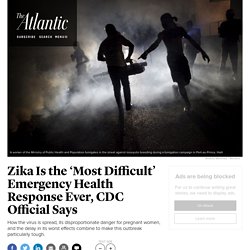
Given that, the White House has threatened to veto the bill. Which would mean still no federal funding for what Anne Schuchat, the principal deputy director of the Centers for Disease Control and Prevention, called “the most difficult” emergency response the agency has ever had to do, on Thursday at Spotlight Health, a conference co-hosted by the Aspen Institute and The Atlantic. Zika is an unprecedented, unique outbreak for several reasons, perhaps the biggest being that it is a disease with two faces. It’s Jekyll and Hyde. For most people, it’s of almost no concern at all. “It tends to go away and then you’re done,” said Anthony Fauci, the director of the National Institute of Allergy and Infectious Diseases.
Zika outbreak: What you need to know. Image copyright AP The World Health Organization has declared the Zika virus a global public health emergency.
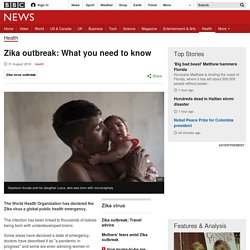
The infection has been linked to thousands of babies being born with underdeveloped brains. Some areas have declared a state of emergency, doctors have described it as "a pandemic in progress" and some are even advising women in affected countries to delay getting pregnant. But there is much we do not know. Zika Virus: Symptoms, Facts, Diagnosis. Zika virus is a mosquito-borne illness that is spread by the Aedes species of mosquito, the mosquito also responsible for the transmission of dengue and chikungunya viruses.1-3 Unlike malaria-carrying mosquitos, this species is mostly active during the day and so barrier methods such as mosquito nets are ineffective.
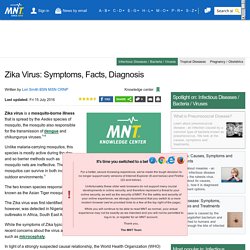
These mosquitos can survive in both indoor and outdoor environments.1. How does Zika virus shrink a baby's brain and other FAQs. Felipe holds the head of his daughter Maria Geovana, who has microcephaly, at his house in Recife, Brazil, Jan. 25, 2016.
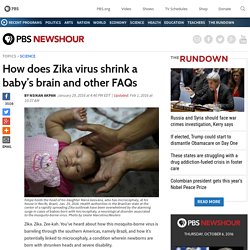
Health authorities in the Brazilian state at the center of a rapidly spreading Zika outbreak have been overwhelmed by the alarming surge in cases of babies born with microcephaly, a neurological disorder associated to the mosquito-borne virus. Photo by Ueslei Marcelino/Reuters. Zika Virus Symptoms, Countries, Risk, and Prevention. Zika Virus: What You Should Know The Zika virus has arrived in the United States, with mosquitoes spreading the virus in an area of Miami Beach and the CDC advising pregnant women to avoid it.
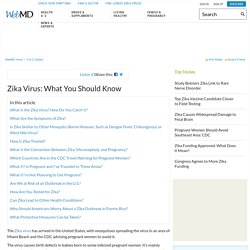
The virus causes birth defects in babies born to some infected pregnant women. It’s mainly spread through mosquitoes, although some cases of sexual transmission have been reported. The Miami neighborhood of Wynwood became the first in the U.S. where Zika was spreading locally. Although a CDC travel advisory for that area has been lifted, pregnant women are still urged to avoid a second transmission zone, a 4.5-square-mile area of Miami Beach. Pregnant women and their partners who live in either area or must travel to them should take steps to avoid mosquito bites. Zika 101. What is Zika? And what are the risks as it spreads? Everything you ever wanted to know about the Zika virus and its spread across North and South America.
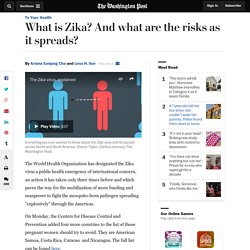
(Daron Taylor,Claritza Jimenez/The Washington Post) Zika virus: 5 things you need to know. The Zika virus, transmitted by the aggressive Aedes aegypti mosquito, has spread to at least 34 countries and territories. WHO estimates 3 million to 4 million people across the Americas will be infected with the virus in the next year. The U.S. Centers for Disease Control and Prevention is warning pregnant women against travel to those areas; health officials in several of those countries are telling women to avoid pregnancy -- in some cases for up to two years. Short Answers to Hard Questions About Zika Virus. Zika virus. Zika Virus: MedlinePlus. Zika is a virus that is spread mostly by mosquitoes. A pregnant mother can pass it to her baby during pregnancy or around the time of birth.
It can spread through sexual contact. There have also been reports that the virus has spread through blood transfusions. There have been outbreaks of Zika virus in the United States, Africa, Southeast Asia, the Pacific Islands, parts of the Caribbean, and Central and South America. Most people who get the virus do not get sick. A blood test can tell whether you have the infection. Zika can cause microcephaly (a serious birth defect of the brain) and other problems in babies whose mothers were infected while pregnant. Use insect repellentWear clothes that cover your arms, legs, and feetStay in places that have air conditioning or that use window and door screens Centers for Disease Control and Prevention.
Overview - Zika virus disease. The mosquito that carries Zika virus is found worldwide. Stay up-to-date on virus disease cases on the CDC's Zika virus disease website. Zika (Zee-ka) virus disease is a mosquito-borne viral infection that primarily occurs in tropical and subtropical areas of the world. Most people infected with Zika virus have no signs and symptoms, while others report mild fever, rash and muscle pain. Other signs and symptoms may include headache, red eyes (conjunctivitis) and a general feeling of discomfort. Zika virus infections during pregnancy have been linked to miscarriage and can cause microcephaly, a potentially fatal congenital brain condition.